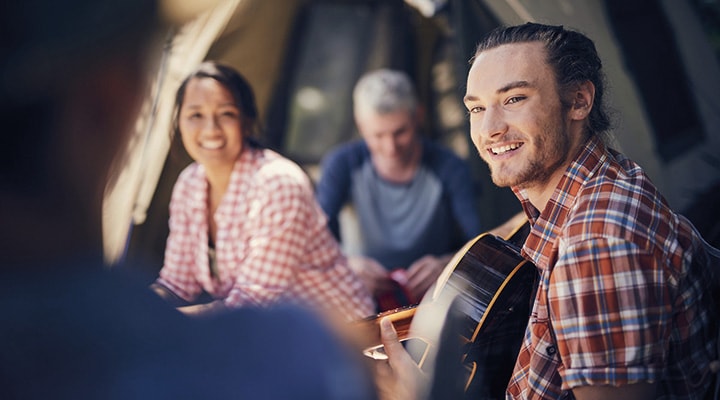YOUR CAMPING SAFETY CHECKLIST FOR A SAFER FAMILY HOLIDAY
As thousands of Aussie families plan to go camping for their holidays this summer, it pays to be ready with camping safety in mind.
How to be prepared for camping with kids
‘Be prepared’ is the Scouting motto, and that’s the perfect advice for first-time campers. Sunburn, scalds, insect bites, frosty nights, food poisoning, infected cuts, even little mishaps can turn into a big deal when camping in Australia.
The trick to calmly managing small incidents while camping with the family and coming home with a sense of true camping success is to think ahead. Belting rain? Pack an extra tarp and pack of cards. Temperature drop? Spare layers in the car. Bleeding stubbed toe? Grab the first-aid kit.
“It pays to think about camping in four key stages: design, planning, enjoyment and review,” advises Dr Clare Dallat, executive director of The Outdoor Education Foundation, which is responsible for thousands of people’s great Australian camping experiences each year.
Design your camping trip together as a family
For the design stage, ask: what does everybody want out of this trip? Are you going somewhere remote or do you want a café within walking distance?
“Sit down with the whole team and agree on your expectations; do your research together,” Clare says. “We know that being outdoors has significant benefits: an increased ability to be independent, learning new skills, and working together. Having a shared goal is your best start; put older kids in charge of researching the location of local hospitals or the insect risks.”

Make a camping checklist before your trip
For a camping safety checklist, “deal with your ‘known knowns’ first,” Clare says. For example, this could include asking yourself:
- Do I know where I’m going?
- Is there phone reception?
- Have I left my details with someone at home or a friend?
- How competent and confident are my 4WD skills?
- Have I checked my gas cylinders for leaks?
- Have I tested my tent?
- Do I have an app or resource to keep on top of fire risks, weather, road access and smoke dangers?
With COVID-safe restrictions on most campsites in place, it’s worth pre-booking your spot on your state’s national park website so you don’t miss out on a spot. The website will have up-to-date information on park closures, social distancing measures and other restrictions.
Try delegating responsibilities to each member of your group: a ‘campsite manager’ responsible for keeping your site tidy. The ‘hygiene king’ to stay on top of hand sanitiser and hot water for dishwashing, and the ‘water inspector’ ensures all water bottles are topped up.
Managing your ‘unknowns’ is about packing the just-in-case items: spare batteries, matches and emergency food – good for a mood boost if not an actual incident. And don’t forget to tell someone where you’re going and when you plan to return. They can become your emergency contact if something goes wrong. Most national parks and wildlife services also have online forms that register your trip intention.
Camping safety tips, from tents to campfires
“‘Look up, look down, look around’ is my partner’s campsite mantra,” Clare says. “Look up for trees and branches that have the potential to drop. Look down for snakes and insects. Look around at boundaries, slopes and trip hazards.
“Be thoughtful about where you put your tent ropes and gear: everybody underestimates the damage that can be inflicted by trips and flips, especially at night with bare feet.”
Setting campsite and campfire boundaries is critical, Clare says, as little ones wandering off, and stove or fire burns, are common sources of potential problems.
If you have children camping with you, hang small reflective flags around the edges of your site. These are a godsend when wandering at night and the kids respect them as a ‘not-without-a-grown-up’ threshold.
Equally, a rope on the ground can be an easy marker for adults-only fire and cooking spaces. Don’t forget to take in your surroundings – setting yourself up for safety, empowers you to embrace the serenity.
Perfect your camping style for next time
Every family camping trip is a chance to improve the next one, so make a point of reflecting on what you’ve enjoyed, what you did well and what you could do better, while sitting around with a hot chocolate under the stars or on your way home, Clare says. Great camping is an art worth perfecting and a valuable inheritance.
First-aid camping checklist
Maintain and check your camping first-aid kit before every adventure. A good off-the-shelf kit will give you a solid base to build on, but it pays to be sure you’re carrying:
- insect repellant
- sunscreen
- antiseptic solution
- tweezers
- painkillers that suit your family
- rehydration solution and constipation tablets
- antihistamine medication for bites and stings
- extra medication for pre-existing conditions like asthma or allergies.
Get 15% off Red Cross first-aid kits and courses
Eligible HCF members can get up to 15% off Red Cross first-aid kits and courses through HCF Thank You loyalty rewards*.
*You can access HCF Thank You offers after you've been a member for a month and if your premiums are up to date. Excludes Ambulance Only and Overseas Visitors Health Cover.
Related articles
Medicine cabinet essentials
Make sure your medical supplies are up to the job – not out of date.
Staying healthy on holidays
From food safety to travel vaccinations, here’s how to have a happy, healthy holiday.
What is ‘leisure sickness’?
Do you get ill the moment you take a break from your work or routine? Here’s how to lower your risk.